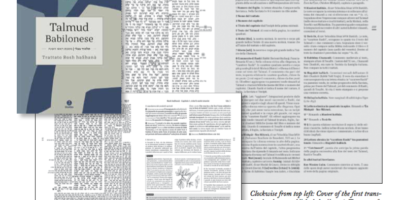
Family Meals Without Reservations

Art by Jensine Eckwall
My family wasn’t Jewish—except on both grandparents’ sides. We celebrated Christmas and Easter and attended Christian Science Sunday School. When my mother cooked, she prepared goyishe concoctions such as tuna-noodle casserole with cream of mushroom soup. Our culinary highlight was Sunday when my grandparents visited bearing bagels, smoked salmon and sturgeon, babka, rugelach and homemade chopped chicken liver. Although I associated these treats with my grandparents, with their love and warmth, I quickly assimilated that they were secret foods, eaten and spoken of only within the confines of our home. The word “Jewish” was mentioned sotto voce only en famille, as if anyone other than a room full of Jews could have heard.
Much as my grandparents accepted me however I was, the pressure from my parents to be perfect was extreme. It was crucial to create me not in their image and likeness, but in what they wanted their own image and likeness to be. From an early age, I absorbed that nothing about me was right. I hated my looks and wanted to be a happy blue-eyed blonde. My father was always snarling, “Wipe that sour expression off your face.” Once, when I came home from school saying “oy oy oy,” he flew into a rage. Another forbidden expression. He drilled me on my speech, my accent, the way I walked. Nothing that could be perceived as Jewish was allowed.
For years I was too skinny—“a string bean.” Despite the Christian Science interdiction against doctors, my mother dragged me from one to another, begging them to make me look normal. I was prescribed an oily brown tonic guaranteed to make me never have to open my mouth again. Suddenly with puberty, I was “too fat,” “too sensitive.” Next, I wasn’t smart enough; he screamed that he couldn’t believe anyone as stupid as I could be related to him.
To her, only her two petits princes mattered. “A woman isn’t complete until she has a son.” She constantly denigrated me, was sadistically cruel, manipulative and rejecting.“No wonder nobody likes you!” “I don’t blame the other kids for bullying you!” “You smell!” “You’re dirty!” “Get away from me!” and worse, always in front of an audience, with what appeared to be the aim of maximum humiliation and annihilation.
The summer I turned 13, my grandparents decided I would go to a Jewish girls’ camp. I was an avid camper and adored the freedom of being away from my all-controlling parents, as well as from the constant and unfavorable comparison to my younger brothers. I was happy. I learned and mastered new skills. It was an all-girls’ atmosphere far from my male-obsessed nuclear family. I thrived. I also learned to enjoy eating instead of regarding it as a chore and arena for battles with my mother.
At the end of my third summer, when we got off the train at Grand Central Station, all the happy-looking parents were wait- ing. Mine gave me severe looks and a peck on each cheek. We went for the traditional breakfast at Schrafft’s. I looked around the room at my friends, animatedly sharing the marvelous times we’d all had with their families. The waitress brought the menu and I ordered pancakes. “You will not!” they both said sharply, my mother adding loudly, “From now on you’re going to need a girdle.” My father ordered half a grapefruit and dry toast for me. We spent the rest of the meal in silence, except for my parents’ haranguing about my weight. “A fat person can never be happy,” pronounced my mother. “We have got to do something!” I knew what she really meant was, You’ll embarrass us. We cannot love a fat [ Jewish-looking] daughter.
As soon as we arrived home, she phoned her mother, whom she hated but always called in hysterics for help. Then my grandmother called her sister, whom she loathed but always called for advice. Three women who fought non-stop had reached a détente in the face of a full-blown crisis of FAT. In a few hours, my marvelous months at camp had vanished. Even though I’d gained weight, I’d felt terrific about myself all summer long.
For dinner that night, while the rest of the family was served a normal meal by our live-in housekeeper, I was given a tiny piece of skinless boiled chicken and vinegared lettuce. Every meal engendered a fight. I was dragged to doctors accompanied by my mother, who did all the talking, screeching at them to “do something!” After she had seen me naked, a horrific humiliation for someone as modest as I, she would scream on the way home, “I never realized you were that fat!” When my favorite teacher was invited to dinner on my birthday, our housekeeper, supervised by my mother, prepared an exquisite lobster salad, one of my favorites. My mother announced, while she served everyone from an elaborate platter, “This is the Mason-Dixon Line for us. The other side is plain lobster for her because she’s too fat.” I hadn’t realized she knew what the Mason-Dixon Line was.
By high school, the pressure to get into Smith College was extreme. Membership in the Ivy tradition would forever erase our [Jewish] past. I had to go to Smith because my mother and her mother had. She and my father met while she was a freshman. “Those were the happiest days of our lives.” I was repeatedly told I would meet all “the right people.” My grandmother emphasized “none of the right people” were Jewish, not the best statement to make about one’s entire family. My eventual acceptance by Smith was the ultimate achievement—for my family.
I stopped wanting to leave my perfect room, impeccably decorated and surveyed by my parents. My beloved grandfather had died just after my 16th birthday, and all I wanted was to sleep to escape. My mother had been experiencing an extended nervous breakdown, referred to as a blood ailment needing to be checked by a doctor three times a week. When I announced the truth, my father, in one of his Jack Nicholson-in-“The Shining” rages, smacked my head repeatedly against the wall, screaming he was going to kill me. For weeks after, I was disoriented and had severe headaches, something I had to hide. Gradually, despite his being a devout Christian Scientist, he metamorphosed into the vengeful deity portrayed in parts of the Hebrew Bible. This ancient Jewish deity, who wore suits from J. Press, ascots and velvet smoking jackets, had taken up residence in earthly form in our faux Colonial home. He threatened to find me no matter where I was in the world for the rest of my life and make sure I’d suffer. If I was ever happy or exceeded my mother’s abilities in anything, punishments would be meted out too terrible to even speak of. Presumably, he would also become immortal, considering the 25-year age difference between us.
The less pleasing life became at home, the more pleasing life without food became as well. Not eating was the only thing left I could control. If I was thin, I’d be loved. I wouldn’t look dirty, fat and “Jewish.” Major realities managed to escape my sharply observant eye: my plummeting grades, my absent period, my exhaustion and lack of any vision of a future for myself beyond thin. The only thing I thought I could accomplish was to be thinner than anyone else. At 5′ 2″ and 55 pounds, I felt too fat, as if I was still taking up too much space.
In our family, The House mattered more than the children. Nothing reflecting our true identity existed there; everything was within our parents’ control. One of my brothers remarked he expected to come home from school and find velvet ropes in front of the rooms. My parents, in their desperate attempt to deny their Jewishness, had ironically become the epitome of the worst Jewish stereotypes—blindly favoring their sons, worshipping wealth and status, hoarding precious objects and being obsessed with food, appearance and weight.
I was sent to a strict Freudian psychoanalyst selected and seen first by my parents. His personality replicated theirs, this cold, judgmental man who was supposed to help me. During the 13 years I saw him, my weight plummeted. When, after 8 years, I worked up the courage to tell him, haltingly and in tears of agony and shame, that I also binged and vomited, his sole response was, “Where do you put the vomitus?” As I diminished, he either yelled,“You cannot psychoanalyze a dying patient!” or “You are vomiting up my interpretations to resist my therapy.” The last of our thrice-weekly sessions ended in a 50-minute tirade in which he screamed I was the worst person he’d ever met; I was stupid, lacked in any redeemable qualities, had no sense of humor, suffered from a sexual perversion (anorexia) and if I were lucky, a state hospital might house me for the rest of my pathetic life. I took the bus back to work, completed editing the manuscript on my desk, went home and took what I’d hoped would be a lethal pill overdose.
The next psychiatrist was also Jewish, though his speciality was Jewish medical ethics. He seemed smart, funny and compassionate and told me he thought I was great. After six hellish months in the hospital, I went home. Anorexia was still overwhelming my life, though I was now around 85 pounds. He seemed so kind and caring. He even gave me comforting hugs, something I craved and had never received from my parents. He said the only way to recover from anorexia was to change from the oral to the genital stage. I was a little freaked by the use of the “g” word. Before I knew what was happening, he was lunging at me, grabbing me, having sex with me. He said because I wasn’t a real Jew (i.e., Orthodox) that this didn’t matter because, for a married Orthodox man, a woman not from his Community didn’t count. What I heard, perhaps because it was familiar: I didn’t count. I became resentful, angry, envious of patients who could use their sessions for their own problems, since he was now burdening me with his personal difficulties and all his cases.
Oddly, instead of turning away from Judaism and the hypocrisy I’d witnessed, I turned towards it. Why? It felt right. Davening felt normal, the motions just came naturally, as if I’d been born knowing how to do them. I began to build my own house, so to speak. The foundation could not be a lie. After 25 years of wrestling with the vengeful god of anorexia, I started attending synagogue.
With my grandfathers dead, my family, save for my paternal grandmother, was aghast. Just as they had been unable to control my body, they had also been unable to control my soul. Judaism was hardly a resolution, but it afforded me a certain peace, the permission to openly be who I am. The type of abuse that took place can’t possibly be undone. Today, in my 70th year, it’s still a daily struggle. Some days I win. Some days I lose.
Fourteen years ago, I left the U.S. for a small town in south- east France, whose Jewish presence was obliterated over 70 years ago. I wear a gold Star of David around my neck, something I would never have done in New York. The physical symptoms of the anorexia have long vanished. The all-consuming fear and anxiety, anger and resentment, perfectionism and self-rebuke, the utter lack of self-confidence and feeling of being both unloved and unlovable, remain. Yes, I have marvelous friends, a beautiful house I own that is filled with rescued animals and the discards, found and treasured objects, of others. And with every word I write, I put distance to annihilation and the past, creating something deliciously me.
Patricia Fieldsteel has published in The New York Times, Newsday, France Today Magazine, BonjourParis.com and wrote an award-winning column in The Villager newspaper.





